The Ultimate Guide to Accountability Coaching


Feeling rudderless and stressed at the top is a common problem. And it happens more than top executives would care to confess.
But then, how do top executives remain at the top? Or how does anyone navigate the overload of everyday tasks and chores, and follow through on their goals?
With a little help in cutting through the clutter and focusing on what really matters.
Rebecca’s turnaround started within weeks of engaging with an accountability coach. Her innate sense of understanding wealth creation returned. Business picked up, and employee morale shot up. She even started losing the stress weight she had gained and reported better mood and overall energy. The ascent wasn’t magic. It was a lot of hard work, a lot of eating crow, and a lot of life editing.
What did Rebecca’s coach do? Did they tell her what she was doing wrong? Did they “fix it” for her?
No!
An accountability coach helps clients stick to their short-term tasks so they can reach their long-term personal and professional goals.

And that’s what Rebecca got from her accountability coach.
She found an external expert support system that kept her focused and nurtured her ambitions in a gentle but firm way. The experience also opened up Rebecca to initiate an accountability program within her firm that boosted employee well-being and performance.
Is this the kind of well-being creation that excites you?
Do you inherently understand what it takes to guide people to their highest potential?
Are you aware of the value such partnerships hold for top-performers like Rebecca and niche service consultants like you?
If yes, then you are ready for the exciting and high-paying world of accountability coaching.
Let’s jump straight in!
What Is Accountability Coaching?
Accountability coaching is not new. It’s been around for as long as human relationships. Think about your parents, teachers, friends, colleagues, bosses, partners. All these people have held you accountable for something or the other all your life.
Remember getting trained in personal hygiene at the age of four? Turning up at the athletics track every day? Recollect the emphasis on task completion in school? Your boss dangling that deadline over your head? Or your partner holding you answerable to your end of the parenting bargain? These are all examples of accountability coaching.
These expectations and resulting habit formations have helped you not fall sick, grow strong, find your favorite subject and ace it, gain expertise, become socially and romantically acceptable, and shine in life!
Most people misunderstand accountability coaching as a process of “invited bullying” or a case of blame placement.
However, the truth is this...
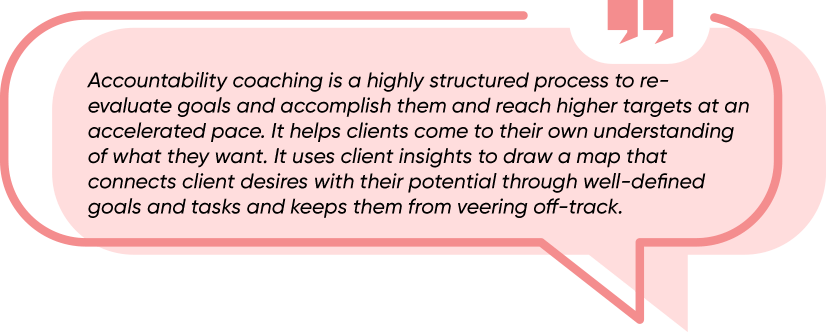
It requires:

Does that sound a lot like life coaching? Well, it is. But not quite.
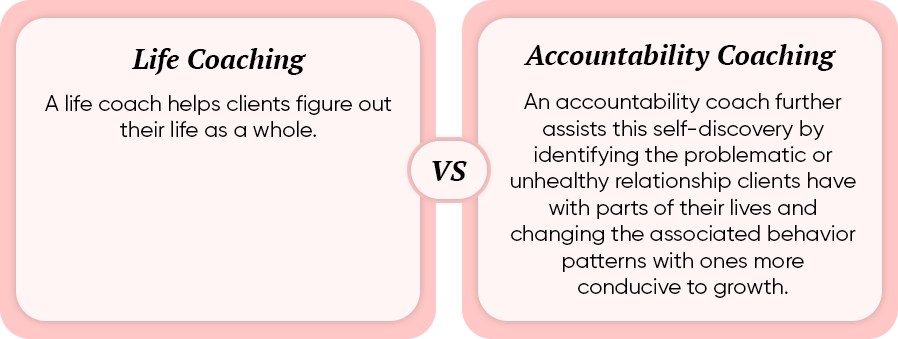
Take Susie’s example. She has been working successfully with a life coach to break patterns of abuse in her relationships. Still, she finds it particularly difficult to change things at work. Unable to say “no,” Susie would often find herself working weekends. The absence of a break leaves her sapped of vitality, making her turn to comfort foods, gain weight, and lose her savings. Susie’s life coach connected her with an accountability coach who helped increase her productivity. This eased her anxiety about the workload, enabling her to say no to working on weekends!
Accountability coaching is a niche within the life coaching universe that enables clients to attain their highest potential in the shortest possible time.
If life coaches enable clients to identify what’s not working in their lives, then accountability coaches ensure that they walk the path they have charted for themselves.
The process of accountability may sound a lot like “Do this. Don’t do that!” But it’s far from it.
Accountability coaches help clients with a range of professional and life issues. They play multiple roles: a supportive friend, a trusted strategist, and an ace Cognitive Behavior Therapy (CBT) trainer to blast through old patterns and help clients stay focused.

Deep diving into a new career choice you’re trying to adopt is excellent. To become a Grade-A accountability coach, answer the following questions:
- 1How will this shift benefit you?
- 2What do you gain from helping others climb their mountain?
- 3What about your own goals and dreams?
- 4Has there been a life event that made you get up, take stock, and turn it around? If yes, what did it teach you?
- 5How do you push yourself to get up and work after biting the dust?
- 6What are your top 5 strategies for beating procrastination?
- 7What life event made you believe that accountability coaching is your calling? What was it and how did you contribute to the solution?
Journal your answers and keep asking more questions. Introspect, hold yourself accountable to do all the things you desire. Keep reassessing your goals. It will increase the likelihood of success.
What Does An Accountability Coach Do?
In essence, accountability coaches nurture winning mindsets and habits. They help people thrive under pressure, retaining the good stress or Eustress - key to overcoming obstacles - and removing the bad stress or Distress that debilitates functioning.
They accomplish this through a 7-step process:
Accountability Coaching Process
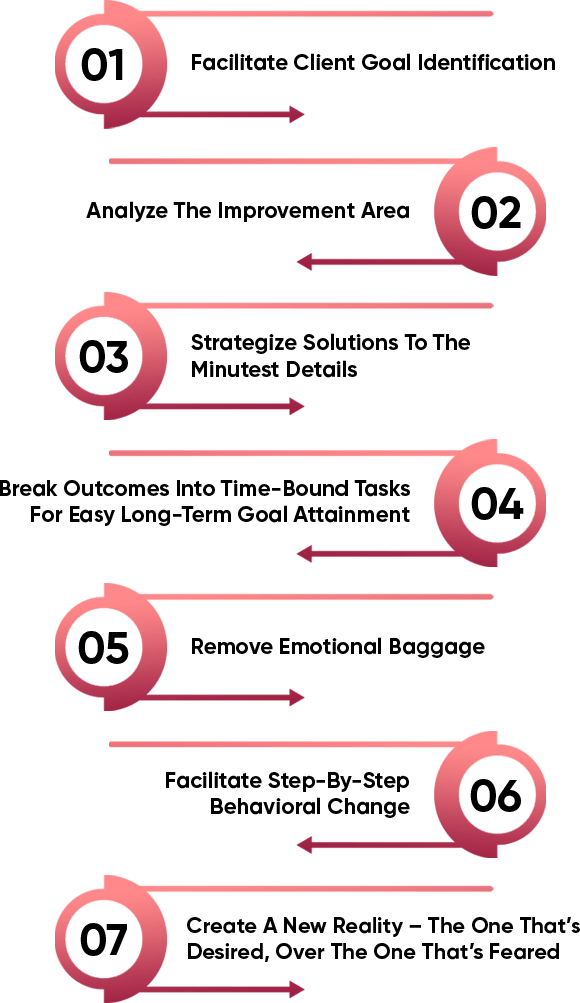
Myths About Accountability Coaching
To better understand what accountability coaches do, let's first understand what they don't do.
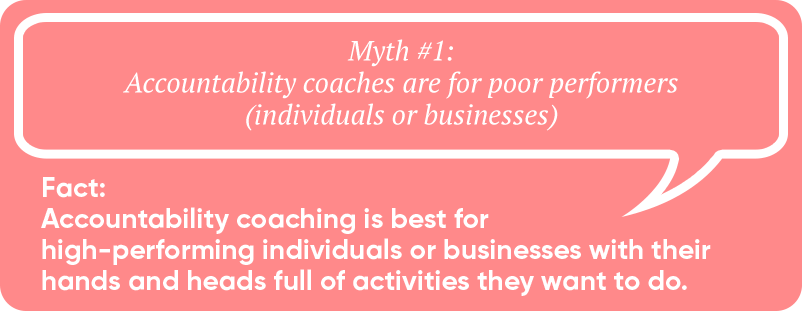
Why? Because with great potential comes great distraction. Such clients will have very high energy and, therefore, very long to-do lists. They see opportunity in more things than an average person and keep adding them to the list of things they want to accomplish.
An accountability coach unleashes the full potential of clients who could be top performers in one area, such as an entrepreneur, but need counsel and assistance keeping it all together. They give a different, external perspective to a problem, unleashing possibilities of new solutions.
So, accountability coaching is for those who are successful and want to be more successful.
Accountability coaches also work as secondary coaches with business and life coaches as a tag team. In such scenarios, while the primary coach will be strategizing to address problems, the accountability coach will focus on implementation to ensure that the job gets done. The primary coach will answer “what,” while the accountability coach will answer “how.”
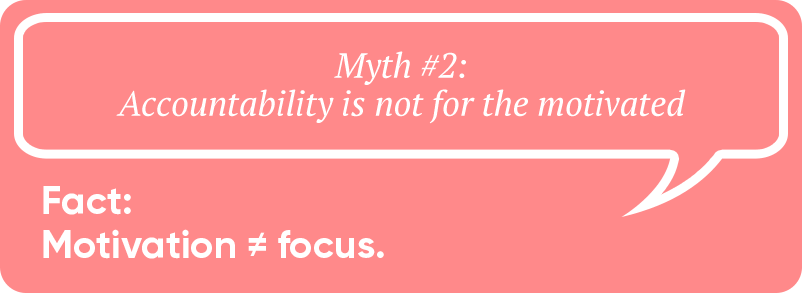
Organizing tasks in order of importance towards a goal and staying focused on completing the most high-stakes jobs is the most significant advantage of having an accountability coach.
For a high-performer or anyone who’s doubling down to build their lives and businesses, focusing all their energy on what’s at stake over what’s at hand or interesting is key to ensuring that all that needs to be done gets done and on time.
Highly motivated people are often juggling a lot of projects. Unfortunately, they also tend to have the Shiny Toy Syndrome. So, staying focused becomes a problem. They can tend to redirect all their energy into a new project, often neglecting their long-term goals or striking off a few things that should’ve been done.
But success only comes with being able to work through your priorities! Clients create to-do lists for a reason. Striking off projects to chase new dreams without taking stock can cost heavily.
An accountability coach keeps clients focused, ensures they’re on track, doing the right thing at the right time based on goals, and not frittering energy away. Accountability coaches are distraction-beaters and direction-keepers.
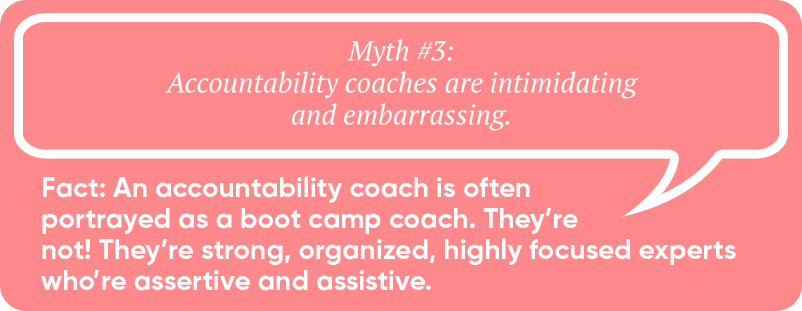
They’re on the same side as the client, not sitting across from them yelling, “why didn’t you do this.”
Accountability coaching is about working together with the client. Not follow suit, or lead the way, but work together!
It’s a partnership and no partnership can ever succeed without mutual respect. It is based on sharing experience and knowledge to create and implement solutions. It’s a no-holds-barred “giving experience” to achieve a common goal – the clients'!
Now, if you’re helping somebody, would you ill-treat them or encourage them? The misunderstanding about an accountability coach being “scary” is more a societal projection than reality.
Remember that a coach says what you need to hear, not want to hear, so you can break through your limits and grow.

One of the most challenges an accountability coach can face with clients is helping them overcome procrastination. Watch this video to understand the 4 reasons why anyone procrastinates and 4 coaching questions you can ask to move towards action.
Skills & Secrets Of An Ultimate Accountability Coach
Now that we’ve busted some powerful myths about accountability coaching, let’s understand what it takes to become an ace coach who creates outstanding results irrespective of the client.
Accountability coaching is all about overcoming personality blocks.
So, it is a lot about understanding how your client processes expectations, what triggers their procrastination, and it all changes with personality. The best of the best procrastinate and it’s not always a sign of laziness. It can also be overconfidence, perfectionism, fear, or even fun.
The BEST accountability coaches are masters of personality identification.
Personality defines how a person deals with their problems and thus defines everything in accountability coaching. As someone who has made it their job to get their clients’ job done without actually doing it themselves, you will have to understand what makes them tick or doesn’t.
Then you can motivate them, keep them focused, understand the blocks their problem-solving methods create, and pitch in with planning and implementation.
Understanding Clients’ Personality Types
Before we deep dive into the vital skill requirements, let’s understand the personality types you’ll encounter from the point of view of expectations.
In her masterpiece book Better Than Before, author Gretchen Rubin talks about the four tendencies framework that defines how people manage inner and outer expectations.
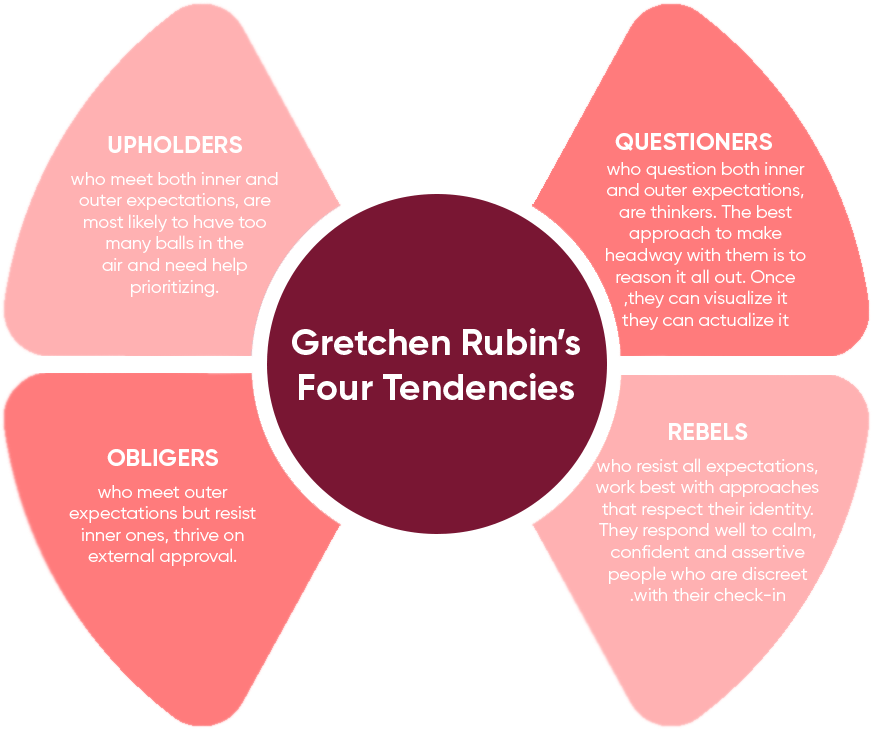
Gretchen adds that these tendencies define entire personalities.
An accountability coach could use these insights to understand how a client’s specific personality type interacts with the world and the strategies that could help generate the best results.
7 Key Skills Of An Accountability Coach


Using the list of key skills below, where we have added some more desirable qualities, score yourself on a scale of 1-5. Identify areas of improvement. Against each skill, list exercises, reading material, and coaching courses you may want to take.
Skills | Proficiency Scale (1-5) | Assistive Material |
|---|---|---|
Self-accountability | Cell | Cell |
Customer-centric | Cell | Cell |
Top planner | Cell | Cell |
Motivation & Humility | Cell | Cell |
Positivity | Cell | Cell |
Patience | Cell | Cell |
Communication (verbal and non-verbal) | Cell | Cell |
Candid feedback | Cell | Cell |
Exit finder | Cell | Cell |
Build expectations & be supportive | Cell | Cell |
Accountability Coaching Niches
Everyone needs support, strategy, and strength to become successful. Everyone needs accountability. Yes, everyone! And there’s research to back it up, too!
A recent study on accountability by the Association for Talent Development lists the varying percentages of success probability depending on the stage of planning and action-taking you are at.
The likelihood of an average individual meeting their goals is just 25% if they are “motivated.” Add a deadline, and you have a 40% chance of task completion. Creating a plan adds another 10 percentage points and promising someone takes it to 60%. But add an external third party to review your progress, aka an accountability coach, and the probability of completing a task/goal increases to 95%!
Many of the world’s most successful people in their fields work with coaches. Think Serena Williams, Andre Agassi, the heavy metal band Metallica, MMA fighter Chuck Liddell and even ex-President Bill Clinton.
This line-up opens a whole world of possibilities!
Like in life coaching, accountability coaching also has niches.
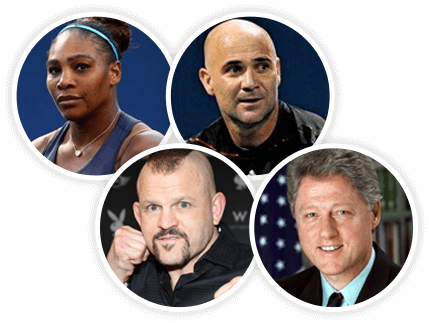
How To Choose The Right Accountability Coaching Niche
If you’re an aspiring accountability coach, here’s what you want to do.
Take some time to sit back and analyze two things:
Together these factors will define how successfully you can address your potential clients’ problems.
Let’s see how.
Area of expertise: An accountability coach needs to be an expert at problem identification, planning, and implementation. So, it bodes well for them to be well-acquainted with the ins and outs of their selected niche
For instance, a financial planner who likes to create abundance for their clients would make a good account ability coach for those aspiring to become rich and the uber rich.
Ideal client selection: Isn’t selecting a niche enough? Not really.
As in life, so in coaching: The only problems you’ll ever solve well and consistently are the ones you enjoy having.
It’s not worth having clients who leave you negative and sapped. It is also okay to disengage with them. But life’s too short for a hit-and-trial method as well. It’s a good idea to create a persona for your ideal client and list down some of their traits.
For example, your ideal client could have the following characteristics:

An ideal coaching niche is the one that marries your expertise with what’s in demand. Choose a niche from the list above. Draw a character sketch of your ideal client and strategize the various ways in which you can help them. Create a problem solving map. List how you will help them attain their goal step-by-step. Foresee the distractions or de-motivators that could crop up and address those as well.
Niche | Ideal Client | Ideal Problems | Strategy | Implementation Plan | Potential Distractors |
|---|---|---|---|---|---|
Cell | Cell | Cell | Cell | Cell | Cell |
Cell | Cell | Cell | Cell | Cell | Cell |
Cell | Cell | Cell | Cell | Cell | Cell |
Cell | Cell | Cell | Cell | Cell | Cell |
Cell | Cell | Cell | Cell | Cell | Cell |
Additionally, you could study the most common problems faced by people and try to devise a way in which you can help them.
Make a list of traits that your ideal clients would have:
How To Become An Accountability Coach
Becoming an accountability coach is not easy or glamorous. This is the “unsexy” part of the coaching industry. It thrives on long-game real results and is only interspersed with the AHA moments that fact-paced clients are hooked to.
But if you’ve decided to dedicate your life to helping others live theirs more fully, then prepare to assume the enormous responsibility that comes with it.
Why? Because you’ll be judging others without being judgmental! You’ll be correcting them without giving them any answers. But, most importantly, you will have to remember that the potential roadblocks your prospective clients face, you will too!
Procrastination and distraction will get in your way. But you will hold yourself accountable for your clients’ success every day! Because clients pick up on energy levels and motivation. They will follow the example you set.
Make A Great Impression On Your First Coaching Session With Any Client
Free coaching session template helps you design the perfect first coaching session for every new client.

